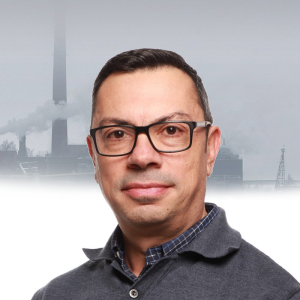
A coffee break with the co-founder
During a break from a conference held in Nokia Arena, Tampere, we sat down with Leonidas Ntziachristos, a professor at Aristotle University, a visiting professor at Tampere University, and one of the founders of Maurus.
Maurus? What does it mean?
It means “black” in Greek, as we primarily measure black carbon, but many outside Finland believe it is actually a Finnish word!
How and where did you start developing this technology that Maurus is currently using?
It is a joint project between the Technical University of Munich in Germany and the Aristotle University of Thessaloniki in Greece. We received the funding from the European Commission.
And how big a project is this?
The first stage lasted five years with approximately 3M euros in funding. It was very nice because we started out with just an idea and ended up with a prototype that was ready for commercialization. Most projects only perform research, but they don’t develop a product.
And first, you needed a prototype?
Yes, it is an academic prototype, as we say. It is something that only we can work with. You wouldn’t be able to use it if I gave it to you, but the principles are there. It works, but the device is large and clumsy. So, Maurus is now developing it into a commercial product. We plan to launch it in 2025.
Will there be some competition?
We’re not the first to measure black carbon, but we have a competitive advantage. This technology, which we call opto-acoustics, is already being used. However, the instruments that use it cost tens of thousands of euros, while our sensor will only be a fraction of that.
Do you have some support from Finland or Greece?
Finland is a very business-friendly and environmentally aware country. Whatever you do to improve the environment is very well recognized here, and you get a lot of support. You not only get support from the scientific and academic world, but also from the government. And it is remarkable that my university, Aristotle University, accepted that the spinoff company is in Finland, and not Greece. It’s not very common. This is unique and innovative. When you have good ideas, borders don’t matter anymore. Finland is the best environment for growing a business like this.
How is your scientific work in Finland?
I have learnt a great deal about environmental physics and aerosols at Tampere University. Finland has strong research groups in Tampere, Helsinki, and Eastern Finland. This field has good expertise because black carbon is an aerosol pollutant, and Finland is among the best in this area. Other companies in Finland are also developing instruments to study various aspects of pollution. So, there is already momentum in the country for such business.
Have you designed the actual device yet? What will it look like?
We are working with an electronics manufacturer here in Finland for the first version of the commercial system. We would like to evaluate all the technical characteristics of this first prototype because its performance will determine our market and the following business decisions.
And it should be easy to use.
Just click the button. It will be effortless
How about EU regulations? Is it already mandatory to monitor black carbon emissions?
The European Union mandates member states to regularly monitor black carbon. The problem is that they have not mandated more frequent measurements, as the devices are expensive and need people operating them. The current devices use paper to measure how much it is blackened out by black carbon. So, now and then, someone will have to go into the field to change the paper. Currently, you can only perform very infrequent and very wide monitoring. But we hope that with our device, we will be able to monitor black carbon without human intervention so you can put it anywhere. Thus, it is possible to build a network of devices. In the future, black carbon may be monitored as easily as air temperature or humidity.
And this will bring the costs of fighting climate change down?
We should find the hotspots and the real problem, and then act. The wide monitoring of black carbon and other pollutants should not be expensive. You can then do something for the specific hotspots. You may divert traffic in different ways. For example, you could put measures in place so that only vehicles of a specific technology can enter a particular area. You can do it if you know where your problems are. There will be many cost-effective ways to cut black carbon emissions and other pollutants this way.
What is happening next
There’s going to be a phase of evaluation by third parties. We will give some devices to people, let them use them, and ask them to provide us with feedback. But we would rather not move too fast. We must be sure that everything works as we have planned.
How about other pollutants?
Gradually, we can measure some of them with the same device and based on the same kind of sensor. This is the interesting thing about light. You can measure different components and aerosols by selecting your light source.
How do you see the future?
The wrong way to address the problem would be to close our eyes and say, “Oh, Finland is clean; we don’t need to know,” or “Greece is dirty in any case; we cannot do anything.” Data and information are crucial because they drive improvements. We are in the 21st century. Think about schools, hospitals, and places that should be clean. Should we measure black carbon right there? Or when you are buying or renting an apartment. Would it be good to know about the air quality in your neighborhood?
So, who will you approach with this groundbreaking technology?
Governments and officials are among the key target groups. Of course, we would like to tell policymakers that cheap devices can be used in Europe. Our sensors enable a cost-effective policy. It’s not all about restrictions, it’s about finding solutions around the hotspots I mentioned earlier.
Have you had conversations with Finnish or Greek officials?
Yes. And we would like to continue the discussions after thoroughly evaluating our product.
Do you see this business opportunity all in Europe?
Europe has the momentum to gain strength because of what is happening worldwide. We have a Greek-German collaboration that established a company in Finland, which has been based on EU money so far. So, it is precisely how things should be done in Europe. And, of course, we would like to grow within and outside Europe because environmental problems are not only in Europe. Here, we have a new, cost-effective, made-in-Europe device that can efficiently measure black carbon without any human intervention. Nothing like that has been done before.
